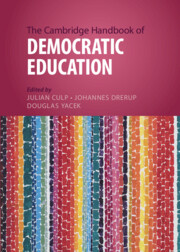Book contents
- The Cambridge Handbook of Democratic Education
- Cambridge Handbooks in Education
- The Cambridge Handbook of Democratic Education
- Copyright page
- Contents
- Contributors
- Acknowledgments
- Introduction
- Part One Historical Perspectives
- 2 Plato on Democratic Education
- 3 Aristotle on Education, Democracy, and Civic Friendship
- 4 Rousseau on Democratic Education
- 5 Dewey on Democratic Education
- 6 Hannah Arendt on the Very Possibility of Democratic Education
- 7 Paulo Freire on Democratic Education
- 8 Rabindranath Tagore on Democratic Education
- Part Two Philosophical and Normative Foundations
- Part Three Key Topics and Concepts
- Part Four Challenges
- Index
- References
7 - Paulo Freire on Democratic Education
from Part One - Historical Perspectives
Published online by Cambridge University Press: 20 April 2023
- The Cambridge Handbook of Democratic Education
- Cambridge Handbooks in Education
- The Cambridge Handbook of Democratic Education
- Copyright page
- Contents
- Contributors
- Acknowledgments
- Introduction
- Part One Historical Perspectives
- 2 Plato on Democratic Education
- 3 Aristotle on Education, Democracy, and Civic Friendship
- 4 Rousseau on Democratic Education
- 5 Dewey on Democratic Education
- 6 Hannah Arendt on the Very Possibility of Democratic Education
- 7 Paulo Freire on Democratic Education
- 8 Rabindranath Tagore on Democratic Education
- Part Two Philosophical and Normative Foundations
- Part Three Key Topics and Concepts
- Part Four Challenges
- Index
- References
Summary
The work of Paulo Freire has had an enduring impact on the development of progressive, democratic pedagogies around the world. Freire’s ideas on democracy emerged from his experiences with impoverished communities in Brazil in the 1950s and 1960s. For Freire, democratic education is a part of the process of humanization: becoming more fully human through transformative, critical, dialogical reflection and action. From a Freirean perspective, democracy is not just a form of government but a mode of being: a distinctive approach to living, with others, in a world that is always dynamically in the making. Democratic life demands a willingness to live uncertainties and an acknowledgment of our incompleteness. Freire delineates a number of key democratic virtues, including humility, openness, tolerance, and a willingness to listen. He argues against both authoritarian and “anything goes” pedagogical orientations. This chapter discusses Freire’s views on democracy and education in the light of his wider ontological, epistemological, and ethical position, and considers the ongoing significance of his ideas in the twenty-first century.
Keywords
- Type
- Chapter
- Information
- The Cambridge Handbook of Democratic Education , pp. 90 - 107Publisher: Cambridge University PressPrint publication year: 2023
References
- 2
- Cited by

